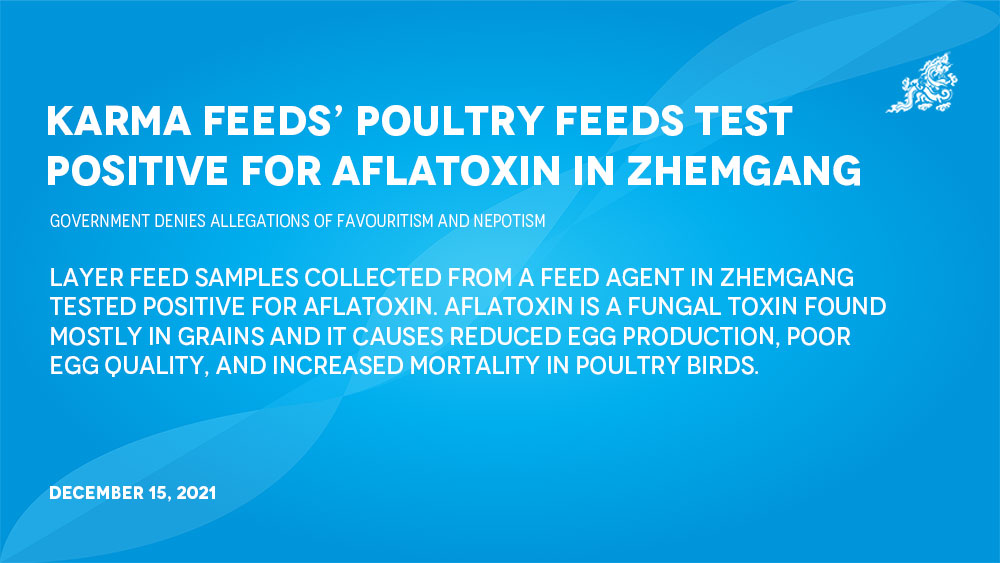Findings inconclusive on samples from Sarpang, Bumthang, and Trongsa
Nima | Gelephu
Layer feed samples collected from a feed agent in Zhemgang tested positive for Aflatoxin.
Aflatoxin is a fungal toxin found mostly in grains and it causes reduced egg production, poor egg quality, and increased mortality in poultry birds.
The feed samples were tested after poultry farm owners complained of high mortality in birds and decreased egg production.
Out of 30 feed samples tested at the Regional Livestock Development Centre (RLCD) in Zhemgang, 90 percent of the layer feed samples manufactured by Karma Feeds in November tested positive for Aflatoxin.
RLCD conducted an investigation and found that the contamination was in broiler finisher crumbles, chicken grower crumbles, and starter crumbles procured on November 3 and 12 in Zhemgang.
The regional director with RLDC, Jambay Dorjee, confirmed the feed types supplied in Tingtibi, Zhemgang, were indicative of feed contamination either from the feed agent or the source.
However, the samples collected from Sarpang, Bumthang, and Trongsa were inconclusive, as the samples collected were not representative of all of the affected farms.
Officials said the centre received only one or two samples from the affected dzongkhags.
“For the samples collected in Zhemgang, it showed that the problem is from the feed source, and not from the farm. But, other dzongkhags, the samples were not representative,” said Jambay Dorjee.
The centre received 10 feed samples from Sarpang, of which only seven were tested and all seven samples tested negative for Aflatoxin. One sample from Trongsa tested positive. Two samples from Bumthang tested negative.
“Findings were inconclusive for other dzongkhags. Therefore, the positive and negative results won’t be clearly indicative of the situation. If we have more samples, there would be more predictions,” said the director.
He said samples from Trongsa, Bumthang, and Sarpang need a thorough assessment to ascertain the cause of the problem.
However, circumstantial evidence received from the farmers in Sarpang showed the problem in layer feed types produced by Karma feeds. Six feed samples were sent to RLDC.
The samples sent to RLDC were from the affected farms.
There was no recommendation from the centre to send representative samplings and pooled samples were sent for the test, as the feeds were recalled, according to officials from the dzongkhag livestock sector.
The postmortem reports done in Sarpang did not show any disease in the poultry farms that saw high mortality and zero egg production in Sarpang.
With close to 40 poultry farmers experiencing high mortality in poultry birds and zero egg production, farmers in Sarpang are most hit because of the recent problem in layer feed types.
Sarpang Layer Cooperative (SLC) in Dekiling collected only 188 cartons of eggs last week. The cooperative collected over 360 cartons of eggs, one week before the poultry farmers used the contaminated layer feeds.
The situation has not improved.
A poultry farmer in Dekiling has lost 60 to 70-day old chicks a day for the past four days. The remaining birds have lost feathers and stopped laying eggs.
The chairperson of SLC, TP Homagain, said that it was disappointing for farmers, as there were no assessments done to date. “Everyone thinks it’s sensitive to talk about the problem facing farmers. We know the problem is in the feed but there is no one confirming it. No one’s accountable for the loss farmers have to bear.”
He said there should be proper and transparent assessment. “Let the people know what caused the problem. We know it was not intentional. We want to know where the lapses were.”
The cooperative has also written to Karma Feeds and other relevant agencies regarding the problem.
TP Homagain said that the relevant authority would directly dispose of any contaminated feeds and products found in farms. “Proper procedure must be followed. Where would the company dispose of the contaminated feed? If nothing was wrong in the feed, why are they taking it back?”
On December 13, the Bhutan Agriculture and Food Regulatory Authority (BAFRA) notified farmers in the country to refrain from using poultry feeds that were produced towards the end of November.
The tentative cause of the large number of poultry deaths from Tsirang, Sarpang, and other dzongkhags were because of poultry feeds manufactured by Karma Feeds, according to the preliminary investigation carried out by the Ministry of Agriculture and Forestry.
The feed company has started to recall the layer feed manufactured towards the end of November.
Jambay Dorjee said that the contaminated feed could be recollected and dried in the sun to be used again with proper testing. “It can also be mixed with fresh feed and supply instead of disposing of it,” he said.


